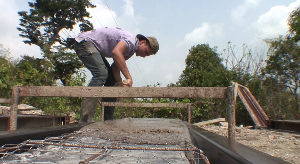Bicycles and the Environment
How we get from our house to place of work is a major factor in daily living. In most developing countries, public transport is insufficient and inadequate and most people simply have no way of getting to work other than a several kilometer footmarch.
Thus, part of our response to integrated and environmentally friendly development was to make bicycles available to the masses.

A process of investigation and synergies with other organizations revealed that almost all of the worlds bicycle parts are manufactured in India and China. Thus, we were able to involve a Latin American engineer studying the question of bicycle transport in Europe. We dispatched him to India to investigate the situation and eventually he instructed the first workers and this paved the way to several bicycle assembly projects.
The full bicycles in knocked down state were purchased in India and shipped to Nicaragua to be assembled. This local industry has become fully self-sustaining and for around fifteen years has provided a viable means of transportation to the local population.
I is easy to know when the town of Rivas is approaching, as dozens of bicycles began to appear on the roads. Bicycle traffic is commonplace in this southern area of Nicaragua, as workers mobilize themselves to the sugarcane fields or factories, deliver bread or mangoes, and schoolchildren get to classes on time.
Not only is the bicycle an environmentally friendly means of transport; for most people it is an achievable dream.

Taken out of From Disaster to Dignity"
published by EcoSouth about 20 years of Grupo Sofonias



